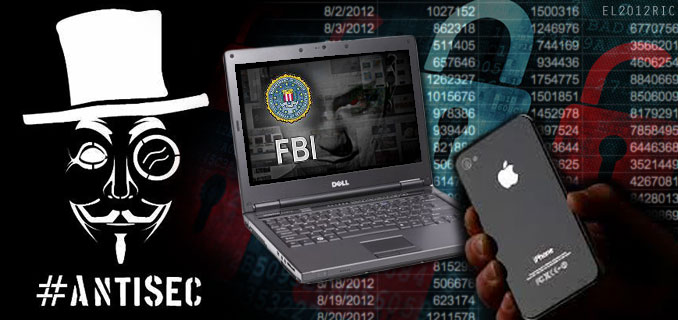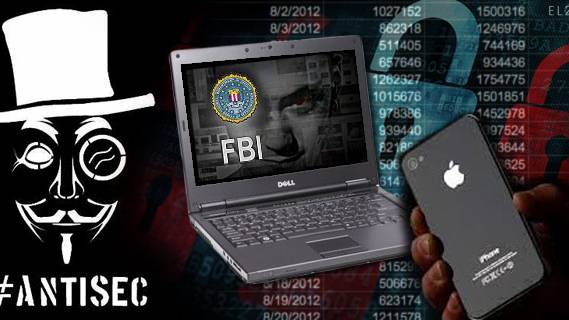Hackers AntiSec claim FBI is collecting Apple IDs, Personal Information
Source: digitaljournal.com

Does this sound familiar? Massive security breach, queue of people denying it’s important, nobody’s responsible and a bit of propaganda. As usual, a simple denial followed production of facts. Looks like nobody’s even pretending to cover up any more.
The story is that AntiSec, a hacking group related to Anonymous, obtained 12 million records of Apple users, supposedly from the laptop of an FBI agent. Those who use Apple products will be aware of the type of information provided to Apple on purchase of their products. This is fairly basic stuff, but it’s also a healthy slice of personal ID.
AntiSec released user ID numbers, 40 character identifying numbers. These numbers are not of themselves a way of accessing information related to users. It looks more like they were used as proof of having obtained the information.
The New York Times:
While the leaked identification numbers appeared to be real, security experts said the release posed little risk. They said that without more information on the devices’ owners — like e-mail addresses or date of birth — it would be hard for someone to use the numbers to do harm.
Not so much of a surprise. The “controlled release” of the Apple user information was apparently vetted by hacker group AntiSec to make a point, not damage user security. They had a lot more info than just user IDs to play with.
A little more information than was contained in The New York Times article comes from CBS News:
Antisec claims that it breached the laptop of FBI special agent Christopher K. Stangl. The group says a spreadsheet on Stangl’s computer contained a list over 12 million Apple devices and included UDIDs, user names, name of device, type of device, Apple push notification service tokens, zip codes, mobile phone numbers and addresses.
That is a hell of a lot of sensitive personal information. You could swipe 12 million identities with that material.
NYT apparently also had a few bones to pick with Anonymous, which recently targeted the newspaper.
In February, Anonymous hackers intercepted a call between the bureau and Scotland Yard. But the frequency of such attacks tapered off after several members of Anonymous and a spinoff group, LulzSec, were arrested in March.
Maybe not so unbiased. Global Post.com explains:
Anonymous is targeting the New York Times for the “failure of the press” to give adequate coverage to Trapwire, what some say is a global system of surveillance run by the US government.
I counted over 1500 news articles on Google News on the subject of Anonymous’ activities worldwide. If that’s tapering off, what’s not tapering off?
Why did the FBI have that information?
Meanwhile back on the subject which everyone seems to be trying very hard to blur as much as possible:
AntiSec did obtain those Apple user IDs.
How?
1. If they were accessed from the FBI as claimed, how did they know where the files were?
2. If the FBI had those files, what the hell were they doing on a laptop?
3. That information, if used for law enforcement purposes, may require a warrant.
4. If not being used for law enforcement, why was it being acquired?
5. Who’s responsible for security of information held by the agency?
6. Is the FBI saying it really needs to have information on 12 million Apple users?
7. If so, why?
Denial, denial and more denial
Those questions have ramifications. The FBI denies it had the information at all. It wouldn’t look too good if it admitted it did. The denial didn’t wash with Anonymous.
ITProPortal.com:
Despite the FBI’s denial, Anonymous was not deterred.
"You know you’re doing something right if @FBIPressOffice throws caps at you on twitter to deny an #Anonymous statement," the @AnonymousIRC Twitter feed wrote yesterday evening.
"Also, before you deny too much: Remember we’re sitting on 3TB additional data. We have not even started. #funtimes #fff," the group posted a few minutes later.
Some more spin, this time absolutely absurd, followed on ITProPortal’s article.
However, security experts were sceptical.
"I personally think it is a PR scam by Anonymous," F-Secure security advisor Sean Sullivan said.
PR scam? Someone gets 12 million user information files with authentic ID numbers and it’s a PR scam for Anonymous? What are they trying to do, sell more cookies by forcing Apple users to buy them or they’ll release their info? Start a chat show and they need the publicity?
This is the other usual component of security excuse-making. The security that was breached, either the FBI’s, Apple’s or more likely both, is obviously is a major contract for somebody. Trivialize the security breach, and downplay the significance of the failure of security, however colossal. Someone will be dumb enough to believe the excuse.
[...]
Read the full article at: digitaljournal.com
Authorities embarrassed as Anonymous hacks FBI-Scotland Yard conference call






















